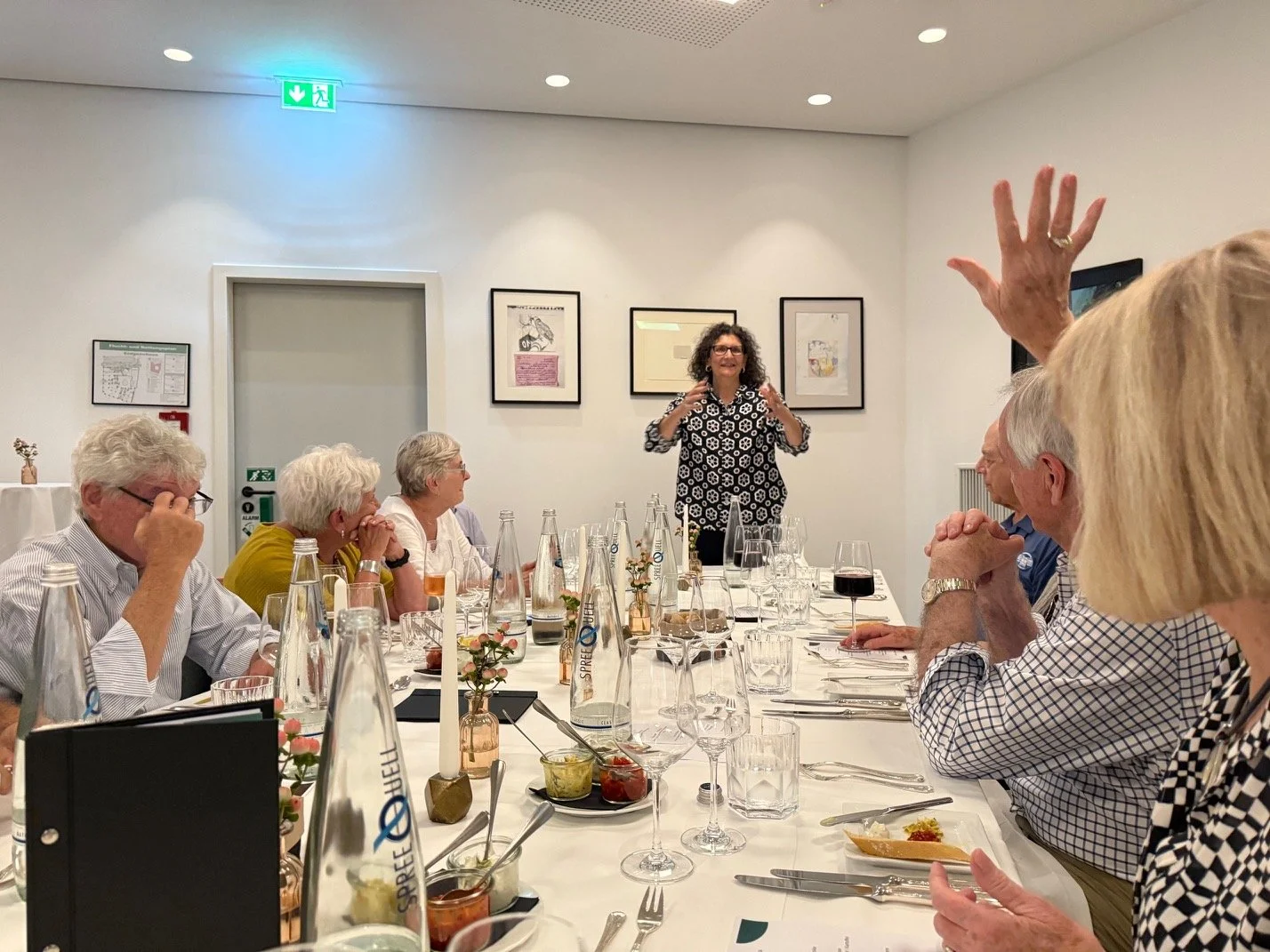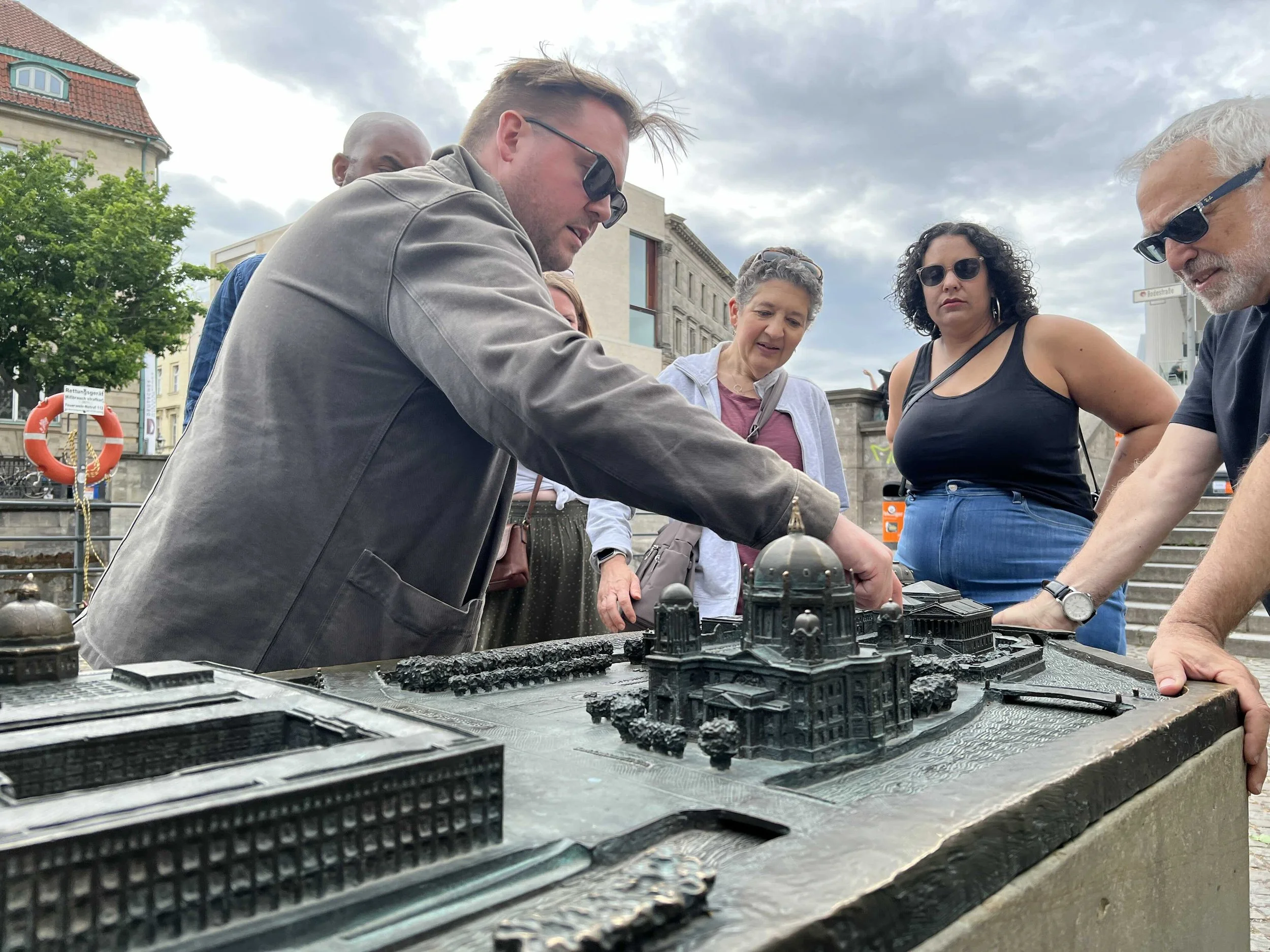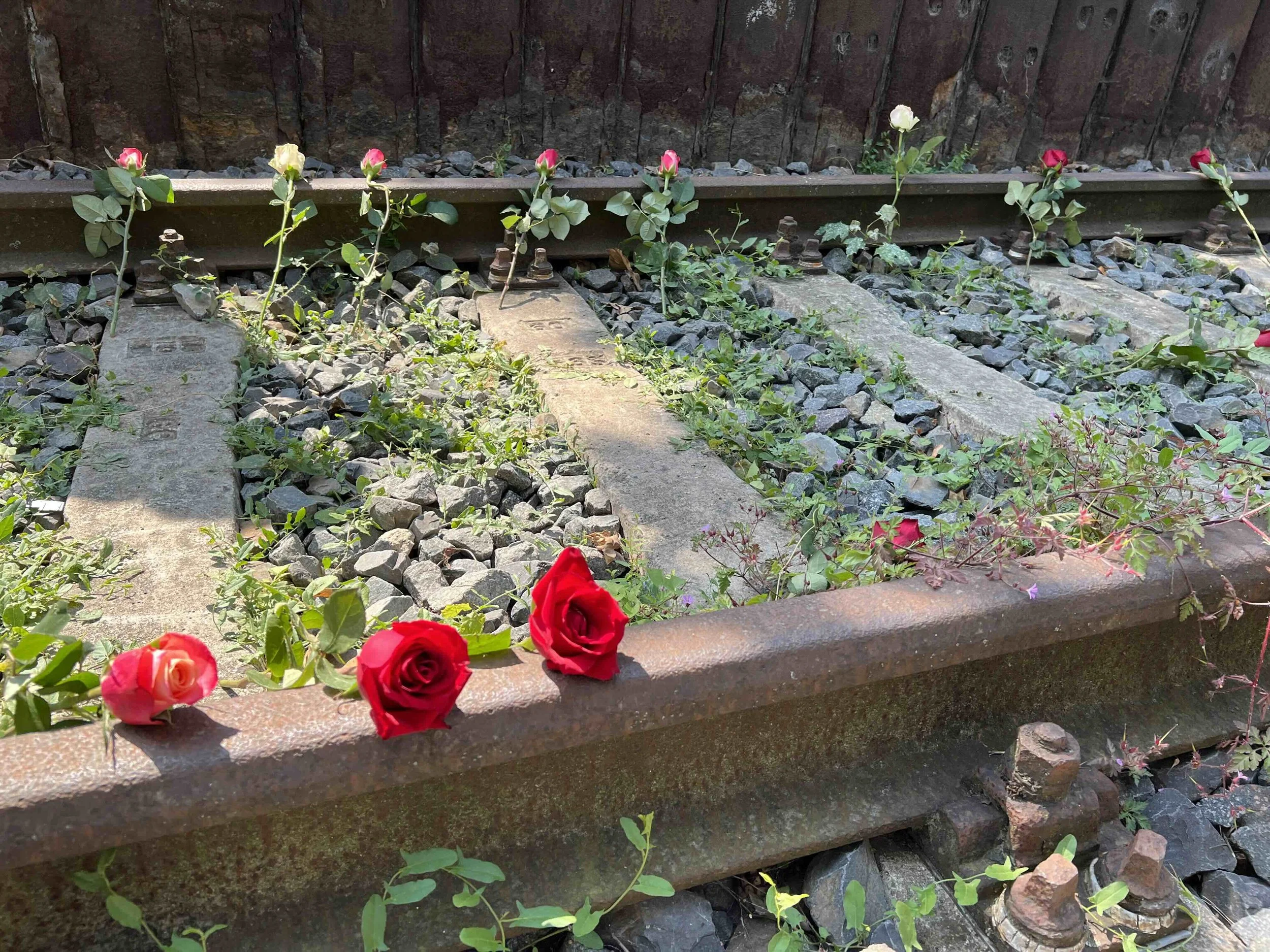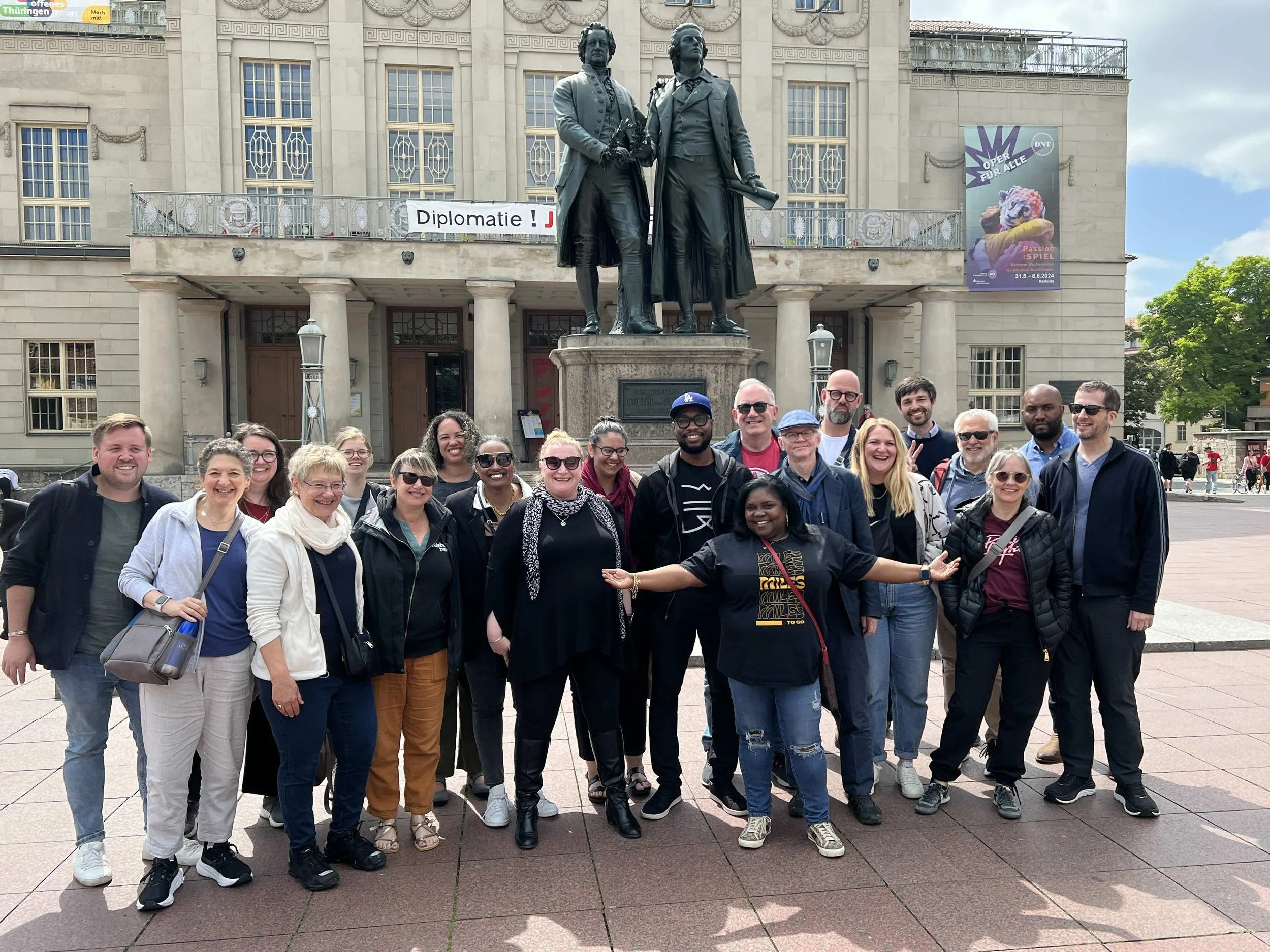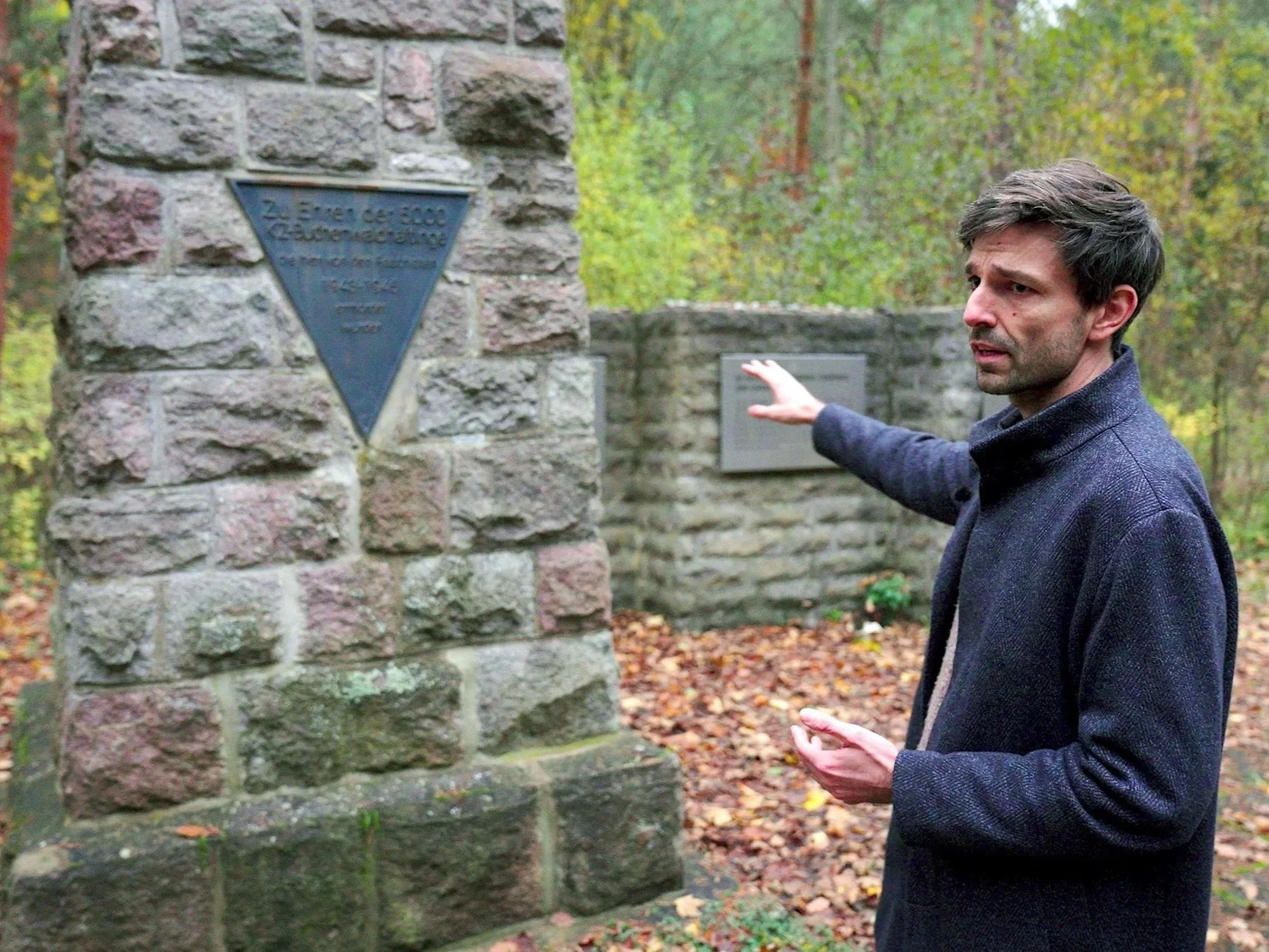Spring Trip to Germany:
Berlin & Weimar • May 2-10, 2026
Exploring Germany's Culture of Remembering Its History, and What It Can Teach Us About Democracy Today
Details
This program is for supporters and friends of Widen the Circle who want to engage with Germany's living culture of remembrance and explore its lessons for democracy, belonging, and justice in the U.S. context.
Cost: $4,950 (per person/double) | $5,450 (per person/single)
*Includes accommodations, most meals, transportation during the program in Germany, and all program logistics (entrances, tips, guiding). Airfare and transport to and from airports not included.
For more information and registration, please email learningprogram@obermayer.us.
Our Program
Wherever you turn in Germany, history speaks, from brass stumbling stones glinting in the sidewalks to synagogues alive with new congregations to neighborhoods where schoolchildren preserve the memory of those once erased. Memory here is not sealed in a museum. It's public, participatory, and deeply human. Widen the Circle’s Spring Learning Program, May 2-10, 2026, invites you to engage with that living conversation. We'll explore how Germans continue to reckon with the past and how those efforts can inform the ongoing struggle for truth and democracy in the United States.
This is not a sightseeing trip. It's a week of learning, dialogue, and reflection guided by some of the individuals shaping Germany's evolving culture of remembrance: teachers, students, political thinkers, and activists; locals and migrants; artists and civic leaders. You will meet the individuals behind these projects—people who choose to remember publicly and act courageously in times that test the limits of democratic resilience.
“The people we met and the work we saw were amazing. We encountered tiny sparks everywhere, and enough sparks make a fire... I was deeply moved by the whole experience.”
Itinerary
Saturday, May 2 – Arrival in Berlin: First Impressions
Welcome to Berlin, a city that insists on remembering. As participants arrive throughout the day, the city's layers begin to reveal themselves. In the afternoon, we'll set out together for a bus tour through the city center, setting the scene and getting our bearings before returning to the hotel in the early evening.
Our stops will include the Berlin Wall (now gone for longer than it ever stood), a synagogue in the heart of Kreuzberg's diverse, predominantly migrant neighborhood where Jewish life is reemerging, and the Museum Island, where the reimagining of Berlin plays out in architecture and on the international stage. The tour will end at a colorful Israeli restaurant in Kreuzberg, where we'll share our first thoughts together over a curated tasting menu. It's the perfect setting to begin the conversations that will carry us through the week.
Reflection question: What are our first impressions of Berlin as a cosmopolitan, urban space in modern Germany?
Sunday, May 3 – Layers of Memory: Getting Started
This morning we'll drive north of the city center to a very different perspective of Berlin. There we'll meet with a group of high school students, mostly from migrant backgrounds, along with their teacher Sabeth Schmidthals. Together they have created and sustained a grassroots memorial at Track 69, one of the largest Nazi era deportation sites, directly across from their school in a working-class neighborhood. Their story embodies how young people make remembrance part of their civic identity.
After lunch in Potsdamer Platz, we'll visit the German Refugee Documentation Center. The center was born out of a call to discuss German communities expelled from eastern Europe after 1945. It provides an important perspective on postwar German history, connecting the experiences of millions of Germans with others who have come to the country through today. We'll explore how Germany sees itself as a refuge and beacon of stability in Europe, and the complexities these factors bring to our current moment.
We'll end the day with a walking tour through Berlin's Jewish Quarter, led by KD Ehmke, a colorful neighborhood historian, Obermayer Award winner, and remembrance activist. The evening brings dinner at a classic schnitzel locale, one of Berlin's culinary favorites, where we'll be joined by Nina Taubenreuther, another important voice in Germany's network of remembrance work.
Reflection question: What was the process that created each place we visited, and what challenges did the respective initiatives face along the way?
Monday, May 4 – Monuments and Meaning: Reckoning with Dark History
Today we take our time visiting the larger national memorials in the city center, diving into the official presentation of history and memorialization at the national level. We'll tour the main memorials in the government district: the Memorial to the Murdered Jews of Europe, the Memorial to the Murdered Roma and Sinti, the Memorial to the Persecution of Homosexuals, and others. We'll also see the Reichstag building and Brandenburg Gate, symbols of both Germany's troubled past and its democratic present.
In the late afternoon, we'll visit the Rosenstrasse memorial before gathering for a three-course meal and have time to debrief from the day's reflections.
The day will end with time for a gallery visit or two, exploring some contemporary art and architecture together.
Reflection questions: How has architecture and the aesthetics of each space conveyed the history in question and created room for conversation? How does memory culture differ at both the grassroots and national levels?
Tuesday, May 5 – Memory and Action: Homes That Remember
This morning we'll visit the Berlin Wall Memorial Documentation Center at Bernauer Strasse, seeing firsthand how this former barrier functioned and how it has been swept away as Berlin stitched itself back together.
We'll have lunch lakeside in the suburb of Wannsee, enjoying the scenic setting before visiting the House of the Wannsee Conference. There, at the site of the infamous 1942 meeting where Nazi officials articulated plans for the Final Solution, our guide from the memorial site will lead us through the exhibition and grounds. We'll consider how effectively the museum has adapted its programs to speak to diverse audiences, many without obvious connection to the specific history of the site.
We'll end the day with a free evening to explore the neighborhood around the hotel, visit another gallery (optional), or simply have a nice meal.
Reflection questions: How do we adapt and continue to inhabit complicated spaces from history? What happens when remembrance moves from public monuments to private homes?
Wednesday, May 6 – Art, Architecture, and Jewish Life
This morning we'll visit the Berlinisches Galerie, Berlin's premier art space for local art from 1880 to 1980. Walking through this exhibition is like time travel, taking us through Berlin's chapters: the Kaiser's era, the Weimar Republic, the Nazi period, new beginnings after 1945, the Cold War in the divided city, and the counter-cultures that evolved in East and West under the shadow of the Wall.
This afternoon we’ll have lunch at and visit the Jewish Museum right next door. This renowned complex, built by Daniel Libeskind in the 1990s, offers a powerful architectural experience. Tanja Berg, a member of Widen the Circle’s Berlin Fellowship, will join us to discuss her current work in the city and her experiences leading the reconstruction of a local Berlin Jewish community center.
The evening brings a relaxed dinner near the hotel, a perfect setting for conversation and reflection before an early night. Tomorrow we depart for Weimar.
Reflection questions: How is Berlin's cultural heritage understood today, considering it represents so much of what the Nazis detested? What does the Jewish Museum represent in modern Berlin, and what challenges face the growing Jewish communities today?
Thursday, May 7 – Eastern Germany: Weimar and Memory
We'll take a morning train to Weimar, heading directly to our centrally located hotel before beginning our exploration of this historically significant city. Weimar holds contradictions: birthplace of Germany's first democracy and also a city connected to some of its darkest chapters.
We'll start together with a visit to the Weimar Constitution Museum, after which we'll have time to split up for the afternoon, with options including the Bauhaus Museum, the new Zwangsarbeiter (forced labor) museum, City History Museum, and Goethe House.
In the late afternoon, we'll gather at the hotel to meet with Raimund Grafe, a friend of Widen the Circle and former government official (Obermayer Award winner from the Erich Zeigner Haus). Over dinner together at the Hotel Elephant Restaurant, Raimund will help us understand Weimar and eastern Germany more broadly, discussing the cultural, economic, and social tensions in the former East and the political issues currently emerging onto the national stage. Before dinner, a local historian will talk to the group about the hotel's own complex history.
Reflection questions: What are our impressions of eastern Germany, away from cosmopolitan Berlin? What does "Weimar" represent within Germany and globally?
Friday, May 8 – Thüringen and Buchenwald: Confronting Memory and Extremism
We'll start with breakfast and conversation with 2024 Obermayer Award winner Christoph Mauny, who will share his insights into life in eastern Germany, the current political crisis, and an overview of his work across the state of Thüringen. Together we'll visit the former concentration camp at Buchenwald, just outside the city, for a tour and time to take in the memorial. As this is also VE Day, or the anniversary of the end of the Second World War in Europe, we will take part in a commemoration.
We'll return to Berlin in the late afternoon, ending the day with dinner near the hotel, where we can process the weight of the day's experiences together.
Reflection questions: What does the future hold for Thüringen and eastern Germany as the country grapples with rising right-wing extremism? How do we approach the form the memorial at Buchenwald takes, balancing memorialization and documentation with accessibility for diverse audiences?
Saturday, May 9 – From Memory to Renewal: Berlin Wall and Museum Island
This morning we'll travel to the Schöneberg neighborhood (where John F. Kennedy gave his famous speech) to visit Marie Rolshoven, a 2024 Obermayer Award winner whose project, Denk Mal am Ort, invites community members into physical spaces—former homes and workplaces of victims of the Nazi period—to learn their stories. We will have the special opportunity to take part in an event of hers, as well as meet 2025 Obermayer Award winner Petra Michalski, who will share her personal story.
The afternoon offers time to visit sites around Museum Island according to your interests: the rebuilt Neues Museum with its bust of Nefertiti, the Altes Nationalgalerie with its German expressionist and classical paintings, or the recently reconstructed Humboldt Forum in the former palace of the Kaisers. We'll engage with this reimagined cultural center—architecturally, artistically, socially—and see firsthand how Berlin takes all of its past into its future.
A closing session and dinner at Remi will allow us to process all we've seen together over these eight days. We'll enjoy the chef's full menu, served family style with wine, as we draw lessons learned, posit open questions, and contemplate what the future may hold.
Reflection question: How can remembrance help build the kind of future we wish to inhabit?
Sunday, May 10 – Departure
Participants depart independently. Auf Wiedersehen!
Guiding Questions
Throughout the journey, we'll return to four questions that frame our exploration:
How has Germany developed its landscape of remembrance, and how does this differ from that in the United States?
How is German society confronting and managing the geopolitical complexities and conflict in Europe at this time, both regular and irregular migration, and the rise of extremist political actors (both domestic and abroad)?
What role does art and the built space around us play in the transmission of history and the tensions at work in contemporary society?
How does Germany remember the destruction of its historical Jewish communities, and how is it both creating places of memorialization and connecting with reemerging contemporary Jewish life within the country? What is the relationship between the Jewish community now and the country’s culture of remembrance?
What lessons can Americans draw from Germany's evolving relationship with its past?While our Berlin Fellowship engages activists and remembrance practitioners, this program is designed for thoughtful supporters and friends of Widen the Circle from the U.S. It's an opportunity to understand our work firsthand, and to experience the impact of historical remembrance as a living force for empathy and change.
Group meals, museum visits, and music will punctuate the week, providing time for community, conversation, and exploration in contemporary Berlin amid our more serious themes. We’ll also enjoy some special cultural experiences, including a visit to a renowned art gallery. Along the way, you'll see how remembrance continues to dynamically shape Germany, and discover how those lessons could illuminate our own moment in the United States.
Contact
To express interest, email LearningProgram@obermayer.us.
About Widen the Circle
Widen the Circle empowers remembrance activists in the U.S. and Germany who confront long-standing injustice rooted in racism, antisemitism, and attacks on democratic values and historic memory, while also promoting healing.
Our programs include:
The Obermayer Awards, honoring German non-Jews who commemorate local Jewish communities decimated by the Nazis and fight modern bigotry and antisemitism.
The Widen the Circle Network in Germany, connecting activists who use remembrance to counter prejudice and strengthen democracy.
The Berlin Fellowship, which brings together American remembrance practitioners with German counterparts to share knowledge and collaborate on community-based initiatives.


